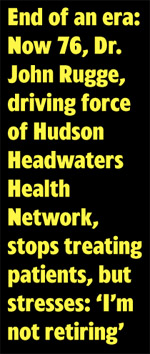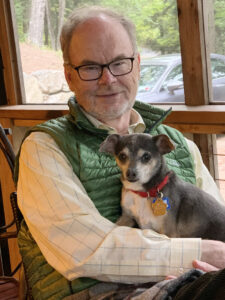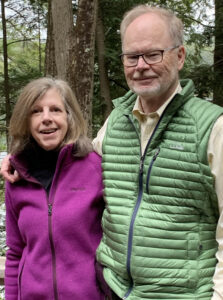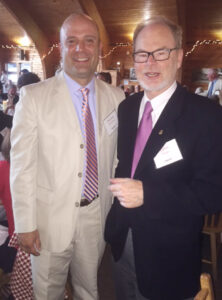By Mark Frost, Chronicle Editor

On Friday, Oct. 30, after 46 years, Dr. John Rugge will stop seeing patients. “Halloween Eve,” he quips. “How appropriate.”
Dr. Rugge turned 76 years old on Oct. 4.
Even as he was the driving force turning Hudson Headwaters Health Network into a far-flung, $110-million primary care juggernaut treating a thousand people a day from greater Glens Falls to the Canadian border, Dr. Rugge kept treating patients.
Even now, “I am not retiring,” he emphasizes. “I am making a transition.”
“I think of myself as having three jobs,” he told The Chronicle in a long conversation at the Warrensburg lake house where he and his wife, artist-sculptor Victoria Palermo, spend much of the year.
“Number-one: Being a physician.
“Number-two: Trying to put together something called Hudson Headwaters Health Network,” which he said created “a whole new model” of providing primary medical care in many places where it was otherwise unavailable, “only surviving with grant funding.”
“My third job is talking about health care in a more abstract way” — addressing its problems, envisioning and effecting its future, on a local, regional and state level.
In 2017, Dr. Rugge said, he gladly surrendered job #2, when he was succeeded as Hudson Headwaters CEO by Dr. Tucker Slingerland. Dr. Rugge calls him “ideal for the job.”
But “stopping the patient care is trickier,” he says. “It’s hard to say good-bye to caring people I cared about a long time.”

As Oct. 30 neared, people shared recollections and shed tears. He mentions the patient who “remembers coming in for a child with an earache. It was day two [of my practice]. That’s my record so far.”
Arrival in the Adks., rural health care crisis
Dr. Rugge, a 1973 graduate of Yale Medical School, came in 1974 to the Adirondacks — specifically to a rental farmhouse in Sodom in the Town of Johnsburg, Warren County — to “finish a canoeing book,” The Complete Wilderness Paddler co-authored with James West Davidson.
“I was gonna be here six months and go back to civilization,” Dr. Rugge says.
Health care in Adirondack towns turned out to be in jeopardy. “A whole generation of GP’s [general practitioners] were retiring,” said Dr. Rugge. “They were immigrants from Germany at the end of World War II. They were Jewish.”
As they looked for places to land, Dr. Maslon, a pathologist at Glens Falls Hospital who was also Jewish, “would call the people at Ellis Island” looking to steer them to the Adirondacks, Dr. Rugge says.
“We’ll put him in Newcomb. He’ll go to North Creek. He can go to Schroon Lake,” he says, explaining how Dr. Otton Lazar, Dr. Jacques Grunblatt and Dr. Phil Sawyer long practiced medicine in those three communities respectively.
Great while it lasted, but then it gave way. “Indian Lake lost its last doctor,” Dr. Rugge said, and “all the surrounding towns [were] losing their physicians,” too.
He said the Town of Chester was especially proactive in seeking to a replacement.
Dr. Rugge said “Howard Swan was the town supervisor, a charming fellow, very energetic…very bright guy” who succeeded in getting “very heart-warming stories” about Chestertown into the New York Daily News, aiming to entice a physician there.
Started by Glens Falls Hospital

After the Town of Chester’s recruitment effort failed, it approached Glens Falls Hospital, whose then-president William Philion agreed to help. Dr. Rugge says the hospital back then did not do primary care, so it launched the Chester health care center “on the ER model” as an extension of its emergency room, even operating 24 hours a day.
Dr. Rugge became involved because “I had stopped in” at the hospital, seeking a short-term opportunity. He said Mr. Philion asked him to be supervising physician of the Chestertown clinic. “My mentor, if you will, was Fritz Hauser,” the doctor who headed the hospital’s emergency room.
Hudson Valley Community College to Troy had just graduated its “first class of P.A.’s” — physician assistants, Dr. Rugge said. They staffed the health center.
It charged patients a flat fee of $8, he said, “for whatever you might have wrong.”
“That didn’t work,” he says, so the hospital “raised the fee all the way to $10,” but the economics continued to be bleak enough that Dr. Rugge drafted a letter that he “put in a drawer,” that said “we’re gonna have to close the Chester Health Center.”
Yet more centers opened. In Warrensburg, he said, “Dr. [Ed] Lawrence was indicating” he planned to retire. The hospital open a health center there, too.
Dr. Rugge said there was no model for making rural health care work. “We had to make it up as we went along,” and there were added “financial pressures imposed by the state.”
Grass roots support; then came the federal
Dr. Rugge said a breakthrough came in the “summer of ’78,” when a woman named Susan Halloway, who was “experienced writing grants for education and health care,” moved to Keene, N.Y. and got involved.
He said the federal government made money available for community health centers, which he said began as “kind of an outgrowth of the civil rights movement,” providing health care to the poor and uninsured. “It got started with LBJ,” President Lyndon Baines Johnson.
In 1978, he said “there was a three-week window” at the last hour to apply. “We put together something like 150 pages in three weeks. Some of it was letters of support. And we were approved — but not funded.” He says they were told, “maybe next year.”
Dr. Rugge said the process also meant “we had to have a name.” He said “Hudson Headwaters” occurred to him as “I was driving from Chester to Warrensburg. That felt right.”
He said the “health network” idea was suggested to him by Fred Vetter during a house call Dr. Rugge made. Rather than “doing one thing at a time,” Mr. Vetter, who headed the Ski Patrol at Gore Mountain, told the doctor, “What you really need is a health network.”
The Town made the mortgage payments on the house the Chestertown center used, but when the year was done, Dr. Rugge said there was a “$16,000 overrun” — a deficit.
Mr. Vetter’s wife “Jean Vetter stepped forward and organized a Ladies Guild that put together a cookbook. They raised enough to convince the town ‘we’re not gonna turn our backs on this. We’re not gonna let this close.’”
Dr. Rugge said local government funding and steadfast grass roots support remain the network’s cornerstone, even as “the feds came through” with the “very first primary care grant anywhere in New York State” encompassing “one in Buffalo, six in New York City and one to Warrensburg.”
It was for “$180,000,” Dr. Rugge says.
“That’s a sizable federal grant. It was based on what our deficit was.”
Dr. Rugge said the federal government “required within two years we had to create a new corporation” rather than “funneling through the hospital administration.”
In 1981, Hudson Headwaters Health Network incorporated. Because it served an “MUA” — medically underserved area — it won designation as a Federally Qualified Health Center. Beyond federal funding, it meant HHHN’s providers were treated “like Army physicians,” Dr. Rugge said, so Hudson Headwaters didn’t have to buy malpractice insurance and had other cost savings.
But Hudson Headwaters being on its own was initially a “scary” time, Dr. Rugge said. “When we started, it was unbankable.”
How did the hospital react to the break-up? “The hospital was kind of relieved basically and supportive” — but not without complications. “We needed a consultant to negotiate the financial separation,” he said.
In stepped Alan Newman from the University of Vermont, who Dr. Rugge notes, “later founded Seventh Generation,” which pioneered selling products with an environmental theme. [Seventh Generation was purchased in 2016 by Unilever, the Anglo-Dutch giant that also now owns another Vermont icon, Ben & Jerry’s Ice Cream.]
Dr. Rugge said the hospital proposed a “50/50 split” of accounts receivable and accounts payable. He said Mr. Newman responded, “yes, 50/50, we take the accounts receivable, you take the accounts payable.”
He said there were tense talks, but “finally Bill Philion came in and agreed.”
Recruitment dinner at Potter’s Diner; political support spans spectrum
Dr. Rugge turned to “recruiting physicians.” He says, “So many had spent the best summer of their lives on Lake George, we were able to find physicians who were willing to take a chance.”
He talks of Dr. Dan Way and his wife Harriet Busch. “She was also a family doctor. I gave her a tour of the Warrensburg Health Center. Then we went off to Potter’s Diner.” He said Dr. Way later confided, “Harriet was pretty surprised” at the choice of dinner spots in recruiting the physician.
“It made it real for them,” says Dr. Rugge. “They were short-termers — only 35 years.”
The early years were “just a blur,” Dr. Rugge said. “We had to make some very big financial decisions.” Example? “We had to have a new typewriter.” He said they agonized, then sprung for the better one at “twice the cost”: $340.
Dr. Rugge says community health centers became a “success story” not just in the Adirondacks but nationally. “Currently 10 percent of all Americans are cared for in community health centers,” he said.
And he says, “People in health centers have lower costs than people treated in other environments.”
Hudson Headwaters has opened centers in other underserved rural communities but also in Glens Falls and Queensbury, which HHHN could enter because they are contiguous to underserved communities.
Dr. Rugge said the community centers enjoy “very strongly bipartisan” support.
He says President Obama’s Affordable Care Act meant that “9,000 people” [Hudson Headwaters patients] gained health insurance “that didn’t have it previously…That got us more than halfway there.”
But he adds, “The biggest support we got until Obama was George W. Bush,” who became a staunch backer, Dr. Rugge said, when he saw how effective they were in Texas when he was governor.
Dr. Rugge volunteers that Rep. “Elise Stefanik is the lead champion in the House” of Representatives in winning funding for community health centers now.
“Obamacare was a nice step forward,” says Dr. Rugge. “I don’t think they were organized, ready for such a huge shift.”
Things “just need to incrementally, year by year, get better.”
The overriding questions, says Dr. Rugge, remain “How do we make this more affordable and how do we get better outcomes?”
He says the U.S. spends more for health care but has “health care outcomes that are short of other nations.”
He acknowledges that costwise, “there is a limit: where it takes 100% of GNP [Gross National Product]. We’re approaching 20%. Right now it’s 18%.”
Change is a constant, system is under stress
Drastic change is a constant challenge for health care delivery now.
“Keeping up with technology and science” is one factor, says Dr. Rugge. Take hospital stays. He said for cataract surgery you’d once “stay a week” in the hospital; now it’s done as an “outpatient in 15 minutes.” Gall bladder surgery meant “a week to 10 days in the hospital. Now it’s day surgery.”
Monitoring tests the hospital performed, like blood oxygen, are done now with “home oxymeters.”
He says he told a recent patient, “Of the 12 medicines you’re taking, 10 didn’t exist when I started.” He says far more effective treatment exists for issues like high “blood pressure, diabetes and renal failure.”
He said Glens Falls Hospital thrived in the 1980s as smaller hospitals in Corinth, Granville and Cambridge closed and Glens Falls gained. But now it’s the one stressed.
Dr. Rugge said specialists are becoming ever more specialized, and patients ever more demanding. Some don’t just want an orthopedist, he said; they want “the shoulder guy.” And Dr. Rugge said the patients most likely to shop and go out of town are the coveted ones with private insurance that pays the hospital and provider more.
Dr. Rugge said he supports Glens Falls Hospital’s recent affiliation with Albany Medical Center, and he insists Hudson Headwaters is not in competition with Glens Falls Hospital.
He said HHHN backs “exactly what Dianne [Hospital CEO Dianne Shugrue] is doing now” in urging authorities to “take a closer look and declare us [the hospital] rural,” which opens up added financial help.
Dr. Rugge says many Hudson Headwaters patients come such a long way that Glens Falls is their only real option, the basis of a rural designation.
Dr. Rugge’s rural health care perspective runs national and international as he ponders larger issues.
In Germany and Switzerland, he says, a person at birth gets “insured for life” by one company, which thus has an incentive for the person to stay healthy, whereas in the U.S. some people switch insurers annually.
He says the Netherlands funds general practitioners, kind of the old school, whose disappearance in the Adirondacks gave rise to Hudson Headwaters in the first place. Dr. Rugge downplays his own role.
“Good faith creates good things,” he says. “I was the lucky one who could watch it, do a little nudging here and there.”
Rugge’s route: Little Falls, N.Y., Williams College, Harvard Divinity School, Yale Med
John Rugge said he was born on a dairy farm in Little Falls, N.Y., and grew up in West Winfield “just north of Cooperstown.”

He went to Williams College in Massachusetts. The only science courses he took “was two years of geology.”
He wasn’t thinking medicine, though his grandfather, Harry Vickers, was a physician.
John went on to Harvard Divinity School. “I was looking at ‘team religion’,” he says, not the ministry, but “philosophy, searching for the meaning of life.”
He said that fieldwork took him to First United Church and the psychiatric ward of the Massachusetts Mental Health Center.
Now medicine entered the picture — but not psychiatry, which he said was too much like religion — “all the denominations, loyalty to one or the other.”
As he earned a Harvard degree — Master of Theological Studies — “I did my pre-med during Divinity School” and went on to Yale Medical School.
In 1974, he came to the Adirondacks to finish writing a canoeing book, expecting to stay here six months. He’s been here 46 years.
A chance connection landed Rugge early on major NYS panel; now busy on boards
Even early on, Dr. Rugge has participated in state-level health care deliberations, initially through a “totally unsolicited and unexpected chance to be a commentator.”
Here’s how he was appointed via a chain of fortunate connection to Governor Hugh Carey’s Health Advisory Council.
When Warrensburg’s last medical practice closed, registered nurse Shirley Anderson, who Dr. Rugge said “really was the bulwark of support for Dr. Lawrence’s practice,” moved to the then-new Chestertown health center.
Mrs. Anderson’s husband Erland was a Realtor who sold an Adirondack property to Long Island patent attorney Tom Dowling. Mr Dowling was friend and neighbor to Dr. Kevin Cahill, who was doctor to Helen Carey, wife of Hugh.
“Hugh was elected governor in the very same week that we opened the Chestertown health center,” recalls Dr. Rugge.
He says the nurse Mrs. Anderson was invited to she take a seat on the powerful Governor’s Health Care Council. Dr. Rugge says she suggested him instead.
Did he make state policy? “That would be an exaggeration,” he says, but he was “there having a ringside seat.”
It was heady stuff. Dr. Rugge said the council considered matters of “unbelievable cost — $15 billion. Here I was struggling to buy a typewriter for $340.”
But “I ended up being an example, somebody with on-the-ground experience doing this new thing — primary care. I was the vouchsafer. I could explain what was happening in the north country. I was the example of the kind of program that might work.”
As the state tried to control costs and expand health care, Dr. Rugge says, “What had to happen was investing in primary care so people weren’t making unnecessary visits to the ER.”
“I think I was the lab rat,” he says. “One thing led to another.”
Today he said he chairs the planning committee of the governor’s Public Health & Health Planning Council that decides on “certificate of need applications,” a prequisite for approving care centers.
He said he also is a board member and secretary of the Primary Care Development Corporation
Closer to home “in 1987 we started the Upper Hudson Primary Care Consortium,” which morphed into the Adirondack Health Institute. Dr. Rugge said it seeks to better “compete for statewide grants” by applying collectively.
He said its successes include a five-year, $160-million grant through “DSRIP” — the Delivery System Reform Incentive Payment program.
Dr. Rugge said he currently chairs the Adirondacks ACO — Accountable Care Organization — that lets doctors and hospitals “work collectively with the payers” to lower Medicare costs without violating anti-trust laws.
He is also a board member of the University of Vermont Health Network, which not only operates Fletcher Allen hospital in Burlington but Champlain Valley Physicians Hospital in Plattsburgh and smaller rural New York hospitals in places like Elizabethtown and Malone.
Asked if he ever served on Glens Falls Hospital’s board, Dr. Rugge said no, suggesting that there’s too much overlap between the hospital and Hudson Headwaters to make it tenable.
He said it doesn’t reflect any friction between the hospital and Hudson Headwaters, noting that Dr. Bill Borgos, a long-time HHHN physician who now is also its medical director, also served on Glens Falls Hospital’s Board of Governors.
HHHN: Local support is the bedrock; win in Wbg. confirmed it
Town support is the “foundation block” of Hudson Headwaters Health Network, says its founder and first CEO Dr. John Rugge. “You take that out and everything else starts to collapse.”
Its initial community health center was located in a house in Chestertown that the Town of Chester paid for.
Dr. Rugge said funding support from a town is a prerequisite anywhere Hudson Headwaters opens a health center.
“Paying the heat and the lights,” he said. “That made it all possible.”
In the early years, when the Chestertown center’s survival was in doubt, “just the encouragement and support” from the community saved it, Dr. Rugge said.
A $16,000 deficit one year was overcome by sales of a cookbook by a newly former women’s auxiliary “and the supervisors who went to bat for us.”
He notes Warrensburg’s “Kevin Geraghty, before being supervisor and chairman of the county board, was a board member of Hudson Headwaters.”
By 1997-98, the network seemed on such solid ground financially that a Warrensburg resident pushed for a special election arguing the town should not be helping fund it anymore.
Dr. Rugge relishes reporting the outcome. “Five to one, the community voted to continue supporting the Warrensburg Health Center,” he says, adding “people came from Thurman wanting to vote,” but only Warrensburg residents could.
“People coming together in an amazing, unanimous way for health care” is why Hudson Headwaters Health Network succeeded, says Dr. Rugge.
Copyright © 2020 Lone Oak Publishing Co., Inc. All Rights Reserved.
 Glens Falls Chronicle Serving the Glens Falls/Lake George region; Warren, Washington and northern Saratoga counties since 1980
Glens Falls Chronicle Serving the Glens Falls/Lake George region; Warren, Washington and northern Saratoga counties since 1980


